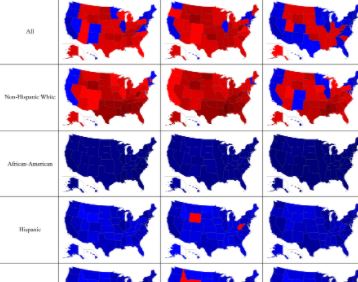by: Thomas R. Cuba, Ph.D., Special To The Free Press
PINELLAS COUNTY, Fla. – It is a human habit to connect things that are the same. It doesn’t matter if the sameness is superficial or substantive, we do it. Perhaps it stems from our hunter-gatherer origins. I simply don’t know.

As I watch the machinery of election gear-up both nationally and here in Pinellas County, I cannot help but marvel at the political targeting system known as demographics.
As it turns out, the word comes from a combination of the Greek word, demos, meaning people, and another Greek word, graphia. The latter, we should all recognize. It is the root for graphite, the lead in a pencil. It is the root of graph, which is a chart. Translated rigidly, demography means people drawing.
In application, it is used to categorize large groups of people by separating them into smaller groups of people who share something: people who have something in common.
Marketing agencies have used the process for years to find the best market for a particular product. That made sense. It was wasteful of the advertising dollar to spend money advertising feminine hygiene products to men and jock straps to women. Political campaigns, pollsters, and self-appointed experts borrowed and restructured the technique. As a result, we now see statements such as, “Candidate so-and-so will take the black vote, but not the women’s vote.” Or we might see, “White males over 39 years old will vote for [our candidate].” The demographic categories are created and populated by computers that suck data from every imaginable orifice of the internet, including government data bases, market data, search engines, voter registration, and voter participation. It is data mining at its best.
Take a breath.
Before we had computers, the practice was known as pigeonholing. Eventually, with the advent of intense scientific inquiries in the field of social studies, the manual method of putting people into small groups was then replaced by a more elegant term: stereotyping. It wasn’t much later, that stereotyping became very politically incorrect. We were told that not all black men could dance and some of them could swim. We were told that not all Mexicans were greasy and not all Jews were greedy. Not all Europeans neglected to shave their armpits. Not all Poles were stupid, and in fact there were Italian men who had exhibited military prowess.
Stereotypes were frowned upon and disappeared from television, magazines, and movies – unless, of course, the show or article was about what happens when people rely on stereotypes.
So, as I watch the polls, and as I watch the political machinery start to make itself felt, I am awestruck that the demographics seem to rely on the same pigeonholes that had been so recently deemed inappropriate, bigoted, racist, prejudicial, and most commonly wrong. In essence, I ask, “What is the difference between saying that black people can’t swim and that black people vote Democratic?” Is it not the presumption of a particular trait or behaviour based on nothing more than race? While statistically valid, is it not likely that variables other than being black or female or over 65 might influence how a particular group might feel about their nation?
Most distressing is that when a different criterion, such as education level or income level is used as the primary factor, the analyst will always seem to want to break things down into race, gender and age. As a result, we don’t see polls that state that people with Bachelor’s degrees vote one way or another. Instead, we see results reported for white people with degrees vs black people with degrees vs latinos with degrees.
I suppose this rambling meander through the changing labels of racism (for racism is nothing more and nothing less than assigning traits based on race alone) has been undertaken to point out that skin color and gender have little to do with political preferences even if there is a correlation – there is no cause-and-effect relationship and therefore, the demographics are just the new pigeonholes.
NOTE: For those unfamiliar with the difference between a correlation and a cause-and-effect relationship, consider the fact that when the Washington Redskins win their last home game of the season before an election, a Republican will probably (>80%) win the presidency. There is a correlation, but I doubt anyone would think there is an actual relationship.
About The Author: Thomas R. Cuba, Ph.D.
Raised a simple Missouri farm boy, Tom managed to attend a British Prep School before commencing a college career that would culminate in a Doctorate Degree in Marine Ecology. He also served as an Intelligence Officer in the U.S. Navy, and as a scoutmaster, SCUBA instructor, Wilderness Survival Instructor, and Firearms Instructor.
Tom has worked as an ecologist in both government and private practice, as well as a freelance nature photographer and computer programmer.
Now, a father and grandfather, Tom offers life lessons in the form of stories about the challenges people face and conquer as well as socio-political essays. To that end, his first lesson is always his favorite quote. “Failure is the whetstone of success.” ~ T. Leith Rettie, 1884.
You can read more from Tom on his site by clicking here.
